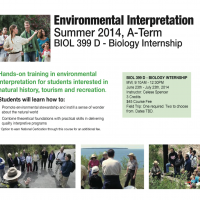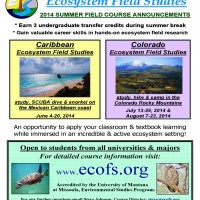This course, BIOL 399D Biology Internship [SLN 10498 Term A] focuses on Environmental Interpretation, and offers hands-on training in practical interpretation and program delivery skills. For students who are interested in careers that interact with the public in the fields of natural and cultural history education, tourism and recreation, and communications. It combines both the theoretical foundations of the profession with practical skills in delivering quality interpretive programming to visitors.
Natural history interpretation can play a critical role in increasing public awareness about the environment. This interpretive course will provide students with the skills and knowledge of communication methods that can promote environmental stewardship and instill a sense of wonder about the natural world by connecting diverse, multicultural audiences to resources and places.
Optional Certified Interpretive Guide (CIG):
The course, in partnership with the National Association for Interpretation (NAI), offers professional certification that students can achieve in addition to course credit.
For questions or more information, email Celese Spencer at celese@uw.edu




